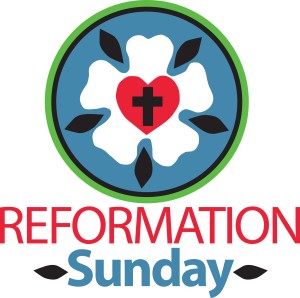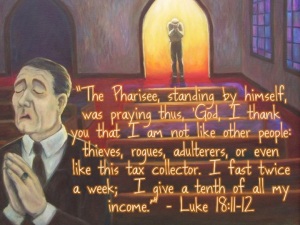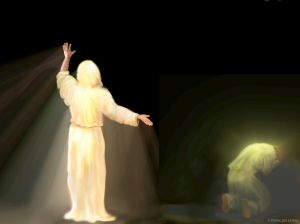“Journeying Home,” Lenten Practices: Prayers of Confession
Psalm 32 and Luke 15:1-3, 11b-32
March 10, 2013
First Presbyterian Church of Jesup
 As we continue our way through Lent experiencing different spiritual practices, today we have another practice that is very familiar to us; one that we participate in every Sunday in worship: prayers of confession.
As we continue our way through Lent experiencing different spiritual practices, today we have another practice that is very familiar to us; one that we participate in every Sunday in worship: prayers of confession.

A prayer of confession is a prayer in which we acknowledge the ways that we have failed to follow God. When we pray our prayers of confession in worship we pray first for our own individual sins and then for our sins as a community.

Historically confessions of sin have taken place throughout one’s community and personal life. Puritans wrote extensively detailed private diaries to allow them to confess their sins to God. These diaries were so thorough and so personal that they were most often burned at the time of the person’s death. Before there was a professional priesthood, Christians would gather together and confess their sins to one another to pray for each other’s healing.  In the Catholic tradition priests use confessional booths to hear the confessions of their parishioners.
In the Catholic tradition priests use confessional booths to hear the confessions of their parishioners.
It seems our society these days is filled with opportunities for confession. One-camera “confessionals” are part of nearly every reality show misconstruing the term “confession” as a venting of frustrations with another or rare moments of self-reflection. The boom of social media allows for quick opportunities to reveal our thoughts to whoever will listen. Many we interact with day to day receive our confessions: hairdressers, bartenders, and strangers in lines.
One-camera “confessionals” are part of nearly every reality show misconstruing the term “confession” as a venting of frustrations with another or rare moments of self-reflection. The boom of social media allows for quick opportunities to reveal our thoughts to whoever will listen. Many we interact with day to day receive our confessions: hairdressers, bartenders, and strangers in lines.
While there is nothing inherently wrong in this self-reflection, we should be aware of our motivation for these confessions. Are we simply trying to clear our minds? Gain accountability or advice from someone we trust? OR are we seeking forgiveness from God and other’s we have hurt out of a repentant heart?
 It’s often a blessedly strange moment when I’m out in public and people find out I’m a pastor. I have been privy to many a confessional: on airplanes, in coffee shops, grocery stores, and just about everywhere else, just by someone learning my title. People often tell me of their church attendance, or lack thereof, confess their desire to strive to be a “good person,” some might tell me of their works in mission.
It’s often a blessedly strange moment when I’m out in public and people find out I’m a pastor. I have been privy to many a confessional: on airplanes, in coffee shops, grocery stores, and just about everywhere else, just by someone learning my title. People often tell me of their church attendance, or lack thereof, confess their desire to strive to be a “good person,” some might tell me of their works in mission.
Often I want to ask, “Why are you telling me?” But then I remember who this position calls me to be. Over the centuries the role of clergy has been as a medium to God’s grace. In the Presbyterian Church we uphold a “priesthood of all believers,” which means that each of us can ask for God’s forgiveness directly. However, it can be a daunting thing to approach God in confession, and so pastors and other clergy become a proxy.
Though these unsolicited confessions can lead to very interesting and insightful conversations, they most often seem like a defensive response, sort of a “making this right,” rather than the thought out contrition of a penitent heart. On the occasion that these conversations become a bit deeper they can lead to some pretty profound views of how those outside a church home view the church and their relationship to God. Many tell me that they don’t go to church because they’re just to busy or haven’t found a church community where they feel at home.
One of the more reflective confessions I’ve been privy to listen to was a young woman who told me that she didn’t like going to church because it makes her feel too vulnerable. This made me both hopeful and sad. Hopeful that she understands the depth that can be found in a church community and sad that she didn’t want to be a part of it, at least for now.
 Confession has long been one of my favorite parts about being a part of a worshipping community. I love the beautiful vulnerability of standing in a room filled with people of all ages and life stages and confessing our brokenness to God and one another.
Confession has long been one of my favorite parts about being a part of a worshipping community. I love the beautiful vulnerability of standing in a room filled with people of all ages and life stages and confessing our brokenness to God and one another.
Imagine what would happen if we went out to other places and relationships in our lives and confessed this same brokenness. Imagine how the world could be changed if we all admitted our mistakes and the ways we create intentional distance in relationship. What a strange and wonderful world that would be.
 So what is it that we’re even doing when we confess our sin? Do we think that our confessions will surprise God? Do we think that our words undo the hurt that we’ve caused to ourselves or to others? Why do so many of us have such an urgent desire to confess our sinfulness? Why is “making things right with God” such a priority?
So what is it that we’re even doing when we confess our sin? Do we think that our confessions will surprise God? Do we think that our words undo the hurt that we’ve caused to ourselves or to others? Why do so many of us have such an urgent desire to confess our sinfulness? Why is “making things right with God” such a priority?
I’ll give you a hint: it’s something I say in worship every Sunday before our confession. Can anyone sum up what I say before we pray together?
“Though God knows our every action, God desires us to confess our sinfulness so that we may be open to Christ’s redemptive action in our lives.”
This is not a traditional liturgy and you won’t find it in any book, but I wrote it to for our community to sum up the Biblical witness as to why we confess our sins together.
Psalm 139:1-3 says:
“O Lord, you have searched me and known me. You know when I sit down and when I rise up; you discern my thoughts from far away. You search out my path and my lying down, and are acquainted with all my ways.”
God knows us intimately; there is nowhere we can go that is apart from God. God surrounds our action and knows our hearts. God is well aware of each and every sin we have committed. God knows when we have willingly chosen other paths.
In 1 John 1:9 we hear:
“If we confess our sins, [God] is faithful and just, and will forgive our sins and cleanse us from all unrighteousness.”
James 5:16 says:
“Confess your sins to one another, and pray for one another, so that you may be healed.”
When we confess our sins it is not God who discovers our sinfulness, but rather it is our eyes that are opened to the presence of those sins and we begin the journey beyond our sinfulness.
Episcopal Bishop, Michael B. Curry writes of the young and rebellious son in our New Testament passage today:
“Jesus uses a marvelous turn of a phrase. Wallowing among pigs, the prodigal ‘came to himself.’ He realizes the profound discontinuity between who he has become and who he truly is. He does not have it figured out, but he knows something is not the way it is supposed to be. He is living a nightmare when he is meant to live his father’s dream. Something inside of him says, ‘You were not meant for this.’”[1]
 We were created to be creatures of Eden. We were created for paradise. The ultimate goal of confession is reconciliation. With the taste of the first sin in their mouths Adam and Eve were expelled from paradise. The paradise was filled with many beautiful creations of plants and animals, but most importantly it was filled with God’s presence. When Adam and Eve were in right relationship with God, God walked with them in the garden. God was tangible and present in relationship with them. Through their sinfulness they willingly sought out a different future, a different path, a life that was apart from the paradise of full relationship with God.
We were created to be creatures of Eden. We were created for paradise. The ultimate goal of confession is reconciliation. With the taste of the first sin in their mouths Adam and Eve were expelled from paradise. The paradise was filled with many beautiful creations of plants and animals, but most importantly it was filled with God’s presence. When Adam and Eve were in right relationship with God, God walked with them in the garden. God was tangible and present in relationship with them. Through their sinfulness they willingly sought out a different future, a different path, a life that was apart from the paradise of full relationship with God.
Ever since that moment God has been creating opportunity for us to touch paradise. God became present on this earth once again, walking among us as Jesus Christ. Jesus served as an example to us of how we could live, how we can demonstrate God’s grace and establish God’s kingdom on earth.
2 Corinthians 5:18-19 says:
“God reconciled us to himself through Christ and has given us the ministry of reconciliation, that is, in Christ God was reconciling the world to himself, not counting their trespasses against them, and entrusting the message of reconciliation to us. “
Confession is necessary for our life together. Only through the authentic confession of a repentant heart can we begin the work towards reconciliation. Reconciliation is not just saying, “I’m sorry.” It is saying, “I’m sorry, will you forgive me?” Reconciliation can be the outcome of confession, but it requires action on both parts.
In our prodigal son story we hear in verse 30 that:
“While [the son] was still far off, his father saw him and was filled with compassion; he ran and put his arms around him and kissed him.”
Once the son even headed in the right direction the father was there to greet him. God’s forgiveness is already there; God is simply waiting for us to come home to grace.
When we are aware of the abundance of grace awaiting us, what keeps us from confessing? What keeps us from seeking God?
 The prodigal son did not feel himself worthy of forgiveness, worthy of coming home. He had struck out on his own, squandered his inheritance, brought shame to his family name. He was caught up in all the wrong that he had done. He did not know what his father’s reaction would be, but he had run out of options in the world outside of his family. He had run out of options in the life of dishonesty, and was forced to seek reconciliation. He did not expect to be restored to his former life, he just hoped to live as a servant.
The prodigal son did not feel himself worthy of forgiveness, worthy of coming home. He had struck out on his own, squandered his inheritance, brought shame to his family name. He was caught up in all the wrong that he had done. He did not know what his father’s reaction would be, but he had run out of options in the world outside of his family. He had run out of options in the life of dishonesty, and was forced to seek reconciliation. He did not expect to be restored to his former life, he just hoped to live as a servant.
 A favorite book of mine, now turned into a movie, “The Perks of Being a Wallflower,” encompasses this in a way that has stayed with me since I first read it as a high school freshman: “We accept the love we think we deserve.”[2]
A favorite book of mine, now turned into a movie, “The Perks of Being a Wallflower,” encompasses this in a way that has stayed with me since I first read it as a high school freshman: “We accept the love we think we deserve.”[2]
The prodigal son did not feel that he deserved forgiveness, or deserved the love of his family, and so he stayed in a life of sin until this life had left him starving.
Today’s Old Testament reading, Psalm 32 speaks of this feeling in verses 3 and 4:
“While I kept silence, my body wasted away through my groaning all day long. For day and night your hand was heavy upon me; my strength was dried up as by the heat of summer.”
But then the Psalmist is turned in verse 5:
“Then I acknowledged my sin to you, and I did not hide my iniquity; I said, “I will confess my transgressions to the Lord,” and you forgave the guilt of my sin.”
 We are called to confess not because we are worthless sinners, but because we are worth so much in God’s eyes that God wants to bring us out of our sorrow and out of our isolation. God wants us to value our lives enough to ask for God to redeem them. To be unrepentant is to be expelled from Eden, purposefully separated from God’s love. To be unrepentant is to be lonely.
We are called to confess not because we are worthless sinners, but because we are worth so much in God’s eyes that God wants to bring us out of our sorrow and out of our isolation. God wants us to value our lives enough to ask for God to redeem them. To be unrepentant is to be expelled from Eden, purposefully separated from God’s love. To be unrepentant is to be lonely.
Presbyterian Pastor Lindsay P. Armstrong wrote, “Focusing on fault and magnifying its importance is not confession but megalomania, as if we know better than God does that we are undeserving of forgiveness. Such a posture narcissistically keeps the focus on our actions, when what God has done and continues to do is far more important. It involves refusing forgiveness and features failure to follow God’s lead into fresh ways of living.”[3]
 Confession is ultimately not about us, or what we’ve done. It is about being drawn to reconciliation, it is about responding to God’s great love and God’s desire to be in relationship with us. Confession is about moving past what we’ve done so that we can be open to what God desires to do through us. Confession is about God.
Confession is ultimately not about us, or what we’ve done. It is about being drawn to reconciliation, it is about responding to God’s great love and God’s desire to be in relationship with us. Confession is about moving past what we’ve done so that we can be open to what God desires to do through us. Confession is about God.
Through confession we are restored to right relationship, we are restored to paradise. May we strive for this life giving authentic confession. Amen.
[1] David L. Bartlett and Barbara Brown Taylor, eds., Feasting On the Word: Preaching the Revised Common Lectionary (Louisville: Westminster John Knox Press, 2009), 119.
[2] Perks of Being a Wallflower. p.27
[3] David L. Bartlett and Barbara Brown Taylor, eds., Feasting On the Word: Preaching the Revised Common Lectionary (Louisville: Westminster John Knox Press, 2009), 106.
 oday is Reformation Sunday, a day that marks the beginning of the Protestant Church as we know it today. It’s a day for celebrating how far we’ve come as a church. Our affirmation of the priesthood of all believers: which means all of us are called to read and interpret scripture, minister to the community, and have a personal relationship with Jesus Christ. The ways that over the generations we continue to be reformed and always being reformed according to the word of God, a principle that has motivated believers throughout the year to stand up for justice for the enslaved, equality of all of God’s created people, and expand the pulpit to women and minorities. So, let’s just pat ourselves on the back! We’re so righteous, so much better than everybody else!
oday is Reformation Sunday, a day that marks the beginning of the Protestant Church as we know it today. It’s a day for celebrating how far we’ve come as a church. Our affirmation of the priesthood of all believers: which means all of us are called to read and interpret scripture, minister to the community, and have a personal relationship with Jesus Christ. The ways that over the generations we continue to be reformed and always being reformed according to the word of God, a principle that has motivated believers throughout the year to stand up for justice for the enslaved, equality of all of God’s created people, and expand the pulpit to women and minorities. So, let’s just pat ourselves on the back! We’re so righteous, so much better than everybody else! Our Gospel lesson gives us a rather confrontational passage for this Reformation Sunday. One that shows someone so pleased by their righteousness, a Pharisee. Verses 11-12 tells us, “The Pharisee, standing by himself, was praying thus, ‘God, I thank you that I am not like other people: thieves, rogues, adulterers, or even like this tax collector. I fast twice a week; I give a tenth of all my income.’”
Our Gospel lesson gives us a rather confrontational passage for this Reformation Sunday. One that shows someone so pleased by their righteousness, a Pharisee. Verses 11-12 tells us, “The Pharisee, standing by himself, was praying thus, ‘God, I thank you that I am not like other people: thieves, rogues, adulterers, or even like this tax collector. I fast twice a week; I give a tenth of all my income.’” It’s an uncomfortable comparison to put side by side with a Pharisee. In Luke 7:29-30 we are told, that upon hearing of Jesus’ miracles, “All the people who heard this, including the tax collectors, acknowledged the justice of God, because they had been baptized with John’s baptism. But by refusing to be baptized by him, the Pharisees and the lawyers rejected God’s purpose for themselves.”
It’s an uncomfortable comparison to put side by side with a Pharisee. In Luke 7:29-30 we are told, that upon hearing of Jesus’ miracles, “All the people who heard this, including the tax collectors, acknowledged the justice of God, because they had been baptized with John’s baptism. But by refusing to be baptized by him, the Pharisees and the lawyers rejected God’s purpose for themselves.” This tax collector doesn’t try to defend himself when being bad-mouthed by the Pharisee. He wasn’t working on a list of his good deeds or his exceptionalism, rather he defers to God’s great power. In verse 13 we read, “But the tax collector, standing far off, would not even look up to heaven, but was beating his breast and saying, ‘God, be merciful to me, a sinner!’”
This tax collector doesn’t try to defend himself when being bad-mouthed by the Pharisee. He wasn’t working on a list of his good deeds or his exceptionalism, rather he defers to God’s great power. In verse 13 we read, “But the tax collector, standing far off, would not even look up to heaven, but was beating his breast and saying, ‘God, be merciful to me, a sinner!’” In verse 14 Jesus tells the assembled crowd, “I tell you, [the tax collector] went down to his home justified rather than the [Pharisee]; for all who exalt themselves will be humbled, but all who humble themselves will be exalted.”
In verse 14 Jesus tells the assembled crowd, “I tell you, [the tax collector] went down to his home justified rather than the [Pharisee]; for all who exalt themselves will be humbled, but all who humble themselves will be exalted.”














